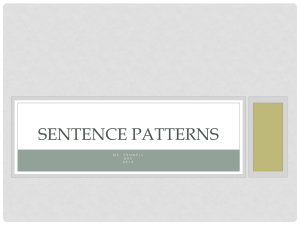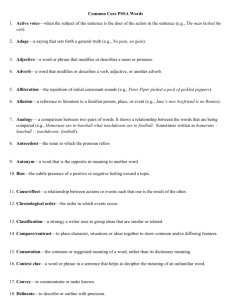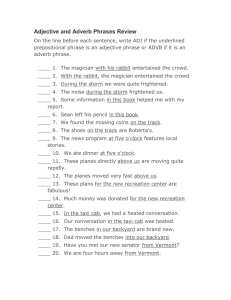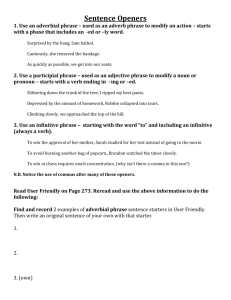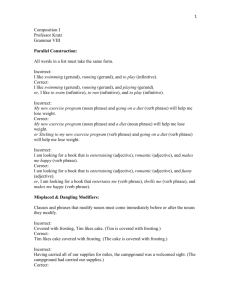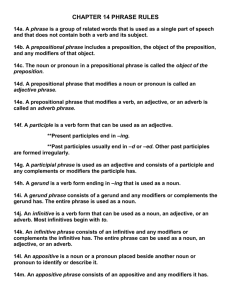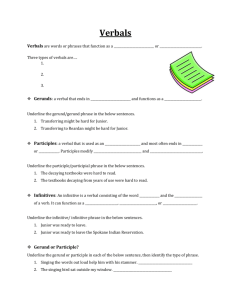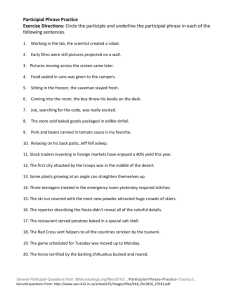Varying Sentence Beginnings - Ms. Mui`s VAPA H English 9 WIki
advertisement
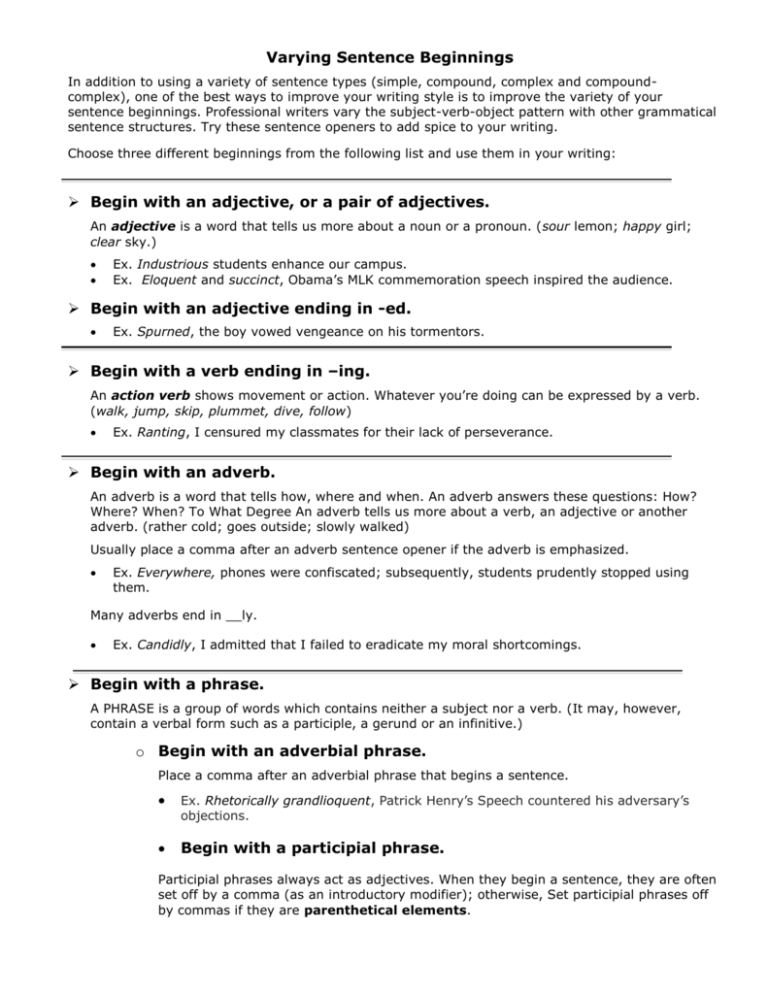
Varying Sentence Beginnings In addition to using a variety of sentence types (simple, compound, complex and compoundcomplex), one of the best ways to improve your writing style is to improve the variety of your sentence beginnings. Professional writers vary the subject-verb-object pattern with other grammatical sentence structures. Try these sentence openers to add spice to your writing. Choose three different beginnings from the following list and use them in your writing: Begin with an adjective, or a pair of adjectives. An adjective is a word that tells us more about a noun or a pronoun. (sour lemon; happy girl; clear sky.) Ex. Industrious students enhance our campus. Ex. Eloquent and succinct, Obama’s MLK commemoration speech inspired the audience. Begin with an adjective ending in -ed. Ex. Spurned, the boy vowed vengeance on his tormentors. Begin with a verb ending in –ing. An action verb shows movement or action. Whatever you’re doing can be expressed by a verb. (walk, jump, skip, plummet, dive, follow) Ex. Ranting, I censured my classmates for their lack of perseverance. Begin with an adverb. An adverb is a word that tells how, where and when. An adverb answers these questions: How? Where? When? To What Degree An adverb tells us more about a verb, an adjective or another adverb. (rather cold; goes outside; slowly walked) Usually place a comma after an adverb sentence opener if the adverb is emphasized. Ex. Everywhere, phones were confiscated; subsequently, students prudently stopped using them. Many adverbs end in __ly. Ex. Candidly, I admitted that I failed to eradicate my moral shortcomings. Begin with a phrase. A PHRASE is a group of words which contains neither a subject nor a verb. (It may, however, contain a verbal form such as a participle, a gerund or an infinitive.) o Begin with an adverbial phrase. Place a comma after an adverbial phrase that begins a sentence. Ex. Rhetorically grandlioquent, Patrick Henry’s Speech countered his adversary’s objections. Begin with a participial phrase. Participial phrases always act as adjectives. When they begin a sentence, they are often set off by a comma (as an introductory modifier); otherwise, Set participial phrases off by commas if they are parenthetical elements. o Begin with a present participial phrase. Ex. Censuring her foul language, Heidi avoided many trips to the principal’s office. o Begin with a past participial phrase. Ex. Oppressed by her parent’s tyranny, Jane resolved to persevere in her studies, so she could get into a college and move out. o Begin with a gerund phrase. A gerund phrase will begin with a gerund (an -ing word) and might include other modifiers and/or objects. Gerund phrases always function as nouns. Ex. digressing in essays is an inevitable way to receive a low score. [gerund phrase as subject] Ex. Jeremy enjoys relinquishing control to his girlfriend. [gerund phrase as object] o Begin with an infinitive phrase. An infinitive phrase consists of an infinitive — the root of the verb preceded by to — and any modifiers or complements associated with it. Infinitive phrases can act as adjectives, adverbs, and nouns. o Ex. To acquiesce to your superiors is constraining. Begin with a prepositional phrase. A prepositional phrase begins with a preposition and ends with a noun. common prepositions: about, above, across, after, against, along, amid, among, around, at, atop, before, behind, below, beneath, beside, between, beyond, by, concerning, down, during, except, for, from, in, inside, into, like, near, of, off, on, onto, out, outside, over, past, regarding, through, throughout, to, toward, under, underneath, until, up, upon, with, within, without. Begin with a prepositional phrase that tells where. Begin with a prepositional phrase that tells when. Ex. Inside the recesses of my mind, I am tormented by malice. Ex. During the class discourse, students followed the decorum of formal debates. Begin with a prepositional phrase that tells how. Ex. Through poetry, I express my deepest tranquility. Use an appositive phrase. An appositive is any information that follows a noun or pronoun to identify or explain it but is not necessary for the sentence’s meaning: if you remove an appositive the sentence still reads coherently. Ex. When it comes to debates, Ms. Mui, not known for her reticence, is a voluble adversary. Begin with a subordinate clause A subordinate clause begins with a subordinate conjunction (although, because, while, during, since, when, if, wherever, before, after, even if, as long as, even though) Although opponents of gay marriage maintain the institution of marriage is inviolate, proponents argue…


